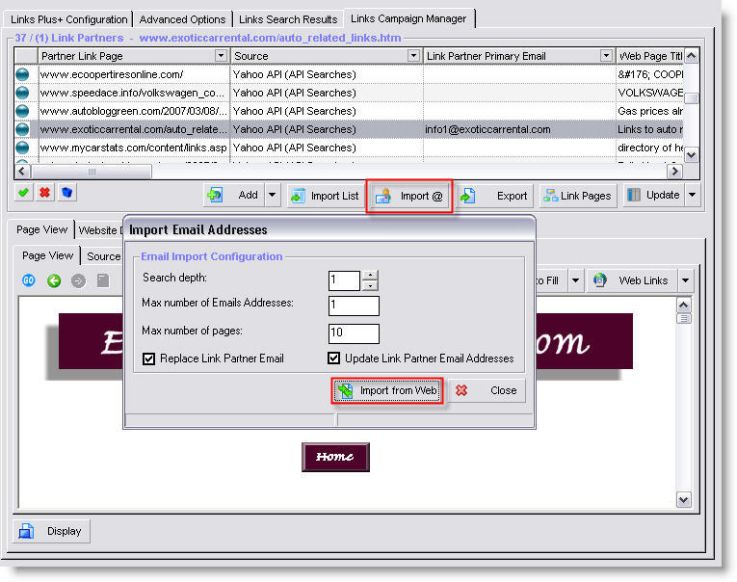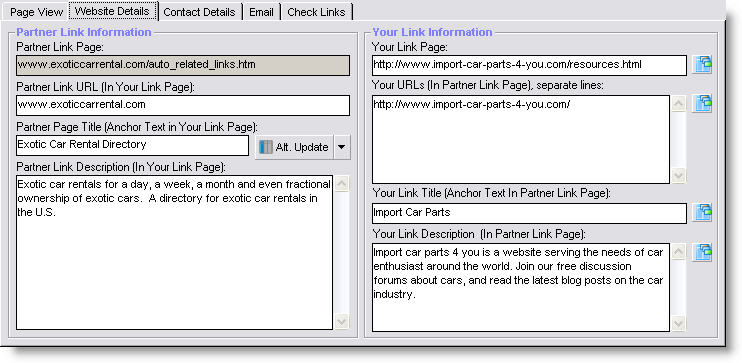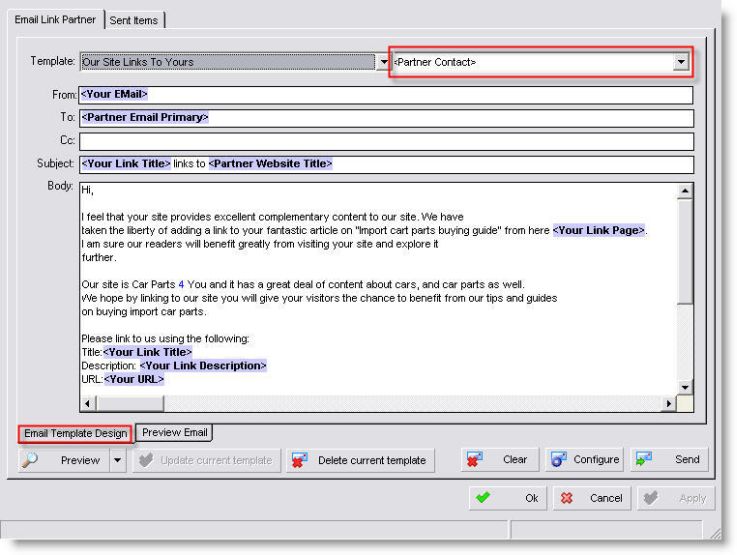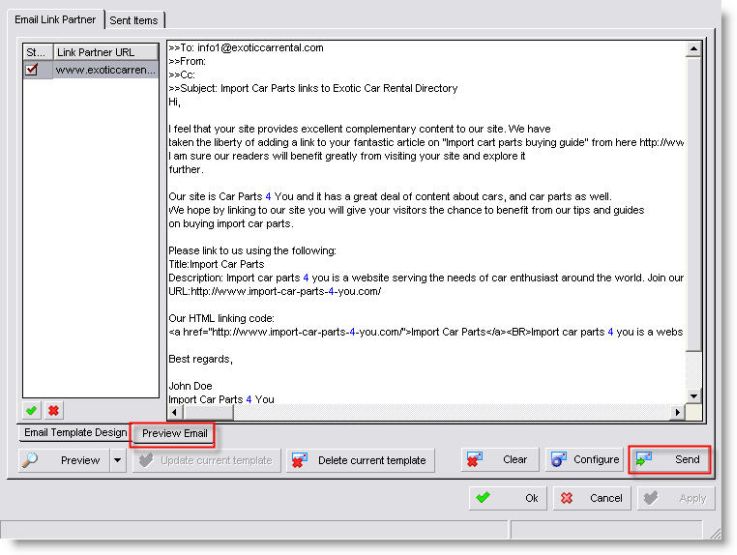Step 9 - Link Exchanges and Paid Links

Introduction
Link exchanges are the favorite methods of new website owners to increase
their site's link popularity. If your website had been around for a while,
no doubt you have received at least one or two emails with the subject
line "Your link has been uploaded.” Ok great, now what? Should you
be impressed? Should you link back to the site requesting the link exchange?
There are a lot of factors you must consider before linking out to sites
sending you unsolicited link requests. We'll cover all them to help you
to make intelligent decisions whether or not you should accept the request.
What happens when the tables are turned, and your new website could
use some much needed "link love"? Should you send out similar
emails requesting link exchanges? Yes and no. There is a right and wrong
way to request links from other webmasters; don't worry, help is on the
way. If you feel your site has something to offer, and it's not just a
collection of self serving affiliate links with a bunch of useless content
around it, then you are well on your way to gaining link popularity fast.
We'll be discussing all the lurking pitfalls of link request, and the
most effective methods to make sure potential link partners will actually
read your link request emails.
Link exchanges done right
We want to make something clear from the outset regarding link exchanges.
A link request should never be based on whether or not a site will give
your site a link back in return for yours. If you had found a great resource
based on merit alone, it should not matter if they link back to your site
or not.
The SEO community itself is very divided on the value of link exchanges
and what, if any, ranking increase can be gained from exchanging links.
In late 2005, Google had released an algorithm update
called "Jagger." This update was widely thought to discount
the value of reciprocal links, and in the update process many sites lost
their top rankings. We have subsequently discovered most of the sites
that lost their ranking were engaged in link exchanges as the sole means
of building their link popularity.
There is a valuable lesson here—don't use link exchange exclusively
to build your site's link popularity. We can't give you an exact number
of exchanged links that can hurt your site's ranking, but as a rule the
search engines should not find more than 20% of all your links reciprocated.
The basic rules of link request emails
You can greatly increase the chances of your link request emails being
read by potential link partners with a few simple to follow tips. There
is noting more annoying than your inbox getting filled with useless sites
requesting a link from you. On top of that, a lot of times these sites
don't even publish their contact information, which indicates there is
no real business behind the site.
Follow these guidelines for email initiated link exchanges:
Build a site
first that delivers value to its visitors with a prominent "contact
us" link on the home page. The
site must be chuck full of good, unique content. It must be indexed by
the search engines before you should send out any link requests, and it
should have a Google PageRank. Having any Google PageRank will greatly
increase your chances of getting a webmaster to reciprocate your link.
You should also create a contact us page and publish your physical address
to show evidence you are running a real business, and you are not hiding
behind an email address only. Create a categorized
link page accessible from your home page. Don't
be one of those annoying web masters who appear to be legitimate link
partners only to burry their link page somewhere deep in the site that
no one can find. Also insert the link page category keywords separated
by hyphens into the URL of the link pages like this: www.mydomain.com/resources/golf-courses/new-york. Link to your link exchange
partners first. As a courtesy you should
link to your potential link partners first since you were the one approaching
them first for a link exchange in the first place. Don't place more than
50 links on a single link page. The
search engines don't like to see hundreds of links on a single page.
It's a far better option to break the
link pages into logical categories and keep the number of links under
50 per page. The Links Plus+ tool has an option to create link pages based
on your main and sub categories. Don't place your link
partners' link on a third party site that has nothing to do with your
website's topic. Three way link exchanges
are easily detected by the search engines and if you over do it, they
may even penalize the sites found to be doing this. Don't name your link
pages with "links" in the file or folder names. This
is only a suggestion; there is no hard evidence to suggest the search
engines value pages with the word "link" in the URL less than
other pages, but you should use "resources" or "partners"
instead to avoid any "link farm." Don't use the obvious
link exchange email subject lines "link exchange" or "reciprocal
links." Most automated link exchange
tools come with a set of predefined templates. Sadly new webmasters send
the same email requests without any regard to personalization. In the
next section we'll help you come up with more persuasive subject lines
that can easily triple the opening rates of your link request emails. Provide some evidence
you have at least checked the home page of the potential link partner's
site. Generally, people take great
pride in their websites, and stroking the owner's ego is a great way to
get them on your side. The more, sincere compliments you can give them
about their website the higher your chances of getting a favorable response
to your link request. -
Specify in
the email your exact link format requirements; if possible provide an
HTML code example. Webmasters are busy
and don't have the time to figure out what is the best way to link to
your site. Give the link partner everything they need to link to you.
Proofread your emails. Receiving emails full of typos and misspellings
are a huge turn off for anyone. If your emails have spelling mistakes
we can guarantee your link request emails will be sent to the trash can
in no time. So do yourself a favor and spell check your emails before
hitting the send button. Set your expectation
based on the perceived value your site can deliver to your link partners.
If your website already has a decent
Google PageRank, maybe a 4 or 5, you can expect a 10%–15% reply rate to
your link request emails. The lower your site's Google PageRank, the lower
the number of replies you will receive to your emails. If your site is
brand new without any PageRank at all, don't expect a higher than 1%–2%
response rate. If you begin to feel discouraged, we suggest you keep on
building up your website's content and quality. Submit to some high PageRank
directories, or start an article distribution campaign to increase your
site's Google PageRank.
An example of an ideal link request email
Writing a catchy, yet sincere link request is not hard if you feel confident
about your site's quality and are proud to show it off to other people.
Your confidence will shine through your email.
Please take a look at the sample link request email below.
|
Subject: Merchant Account Guides links to Merchant AccountX
Hi,
I feel that your site provides excellent complementary content to our
site. We have taken the liberty of adding a link to your fantastic article
on "How to select the best merchant account" from here http://www.merchant-account-guides.com.
I am sure our readers will benefit greatly from visiting your site and
explore it further.
Our site is Merchant Account Guides and it has a great deal of content
about merchant accounts as well. We hope by linking to our site you will
give your visitors the chance to benefit from our tips and guides on applying
for merchant accounts.
Please link to us using the following:
Title:Merchant Account Guides
Description: Merchant Account Guides offers unbiased review of all merchant
account providers for US and international businesses.
URL:http://www.merchant-account-guides.com
Our HTML linking code
<a href="http://www.merchant-account-guides.com">Merchant
Account Guides</a>><br />Merchant Account Guides offers
unbiased review of all merchant account providers for US and international
businesses.
Best regards,
John Doe
Merchant Account Guides |
Let's uncover the reasons why this sample link request would most likely
get a favorable reply.
The subject line tells the potential webmaster
up front the website Merchant Account Guides want to link to them, which
eliminates any guessing whether the site is related to merchant account
providers. The link request describes a specific article
on the link partner's site, which proves the link requester actually took
a close look at the site. The link requester describes their own site which
is closely matches the target link partner's site. The email specifies the link format requested
and also provides an alternative HTML code for easy copying and pasting.
Link partner selection criteria

Once again the selection criteria that apply to directories and article
directories largely apply to link partners as well. When it comes to link
exchanges, your most important focus should be to seek out link partners
that run real businesses and not just a link page directory of unrelated
junky sites. The Google PageRank and the website's age are also very important
considerations, but above all, you should always aim to exchange links
with closely related sites.
This is where the Links Plus+ tool can be very handy to speed up the
link partner selection process. Enter a keyword term to search for top
ranking sites, or use your direct competitors to find sites linking to
them. In both cases, you can harvest a large amount of data to help your
link partner evaluation process.
Here are some of the top selection rules for link partners:
You should not exchange
links with porn, adult, gambling medical, drug, pharmacy sites. Unless your site falls into one of these
categories don't exchange links with these sites, otherwise you are risking
your own site being penalized. The theme of the link
partner site and the main keywords you are targeting should be similar,
but not your direct competitor. It's
unlikely your competitors will link to your site, but there are usually
dozens if not hundreds of others sites with similar themes that make perfect
link partner candidates for your site. Choose sites that match
your site's main language and geographical location. This
should be pretty obvious, the search engines measure relatedness
based on language and location as well.
Finding link partners in the same country or locality matters a great
deal if you are targeting "geo" focused keywords i.e. "Dallas
real estate" "San Diego divorce attorney" etc. Don't exchange links
with sites that use pop ups, have too many ads, and other intrusive advertising.
Do you want to send your visitors to
sites that are nothing more than an advertising billboard on the web? The Google PageRank
of the linking page should match your own Google PageRank. Webmasters
are still very much obsessed with the little "green bar" and
will most likely demand a link from a page on your site that is equal
or better than theirs. Since this practice is not about to stop until
Google does away with the Google PageRank, you should ask your links to
be placed on resource pages that have a Google PageRank of 1 at least.
A zero Google PageRank site could mean one of two things. The site has
been penalized by Google, or it's brand new and has no inbound links yet. Your link partner's
link page must be search engine friendly with no redirects, cloaking,
META tag "NOINDEX" tag, or frames. This should be your
minimum criteria for any link exchanges. If the search engines can't index
the link page, you links will never be "seen" by the engines.
The link page must already be indexed and cached by Google MSN, and Yahoo!.Check
it with the Google Toolbar. Your link must
be formatted as a plain text link with no JavaScript or the "rel=nofollow"
attribute. Script
based links, or links with the "rel=nofollow" attribute will
not give your site any link popularity benefit, and it also won't pass
any Google PageRank. This is one of the favorite methods of unscrupulous
webmasters to gain one-way links for their own site by fooling new webmasters
into thinking they are getting a link back to their site, when in fact,
the backlinks is useless. Don't accept
links from third party sites called 3-way link exchanges. The link
must be placed on the site you are linking to. The concept of 3-way link
exchanges have been around for a while, but the search engines got smarter
and now can easily find 3-way linking schemes. In some cases they may
even penalize sites who are aggressively building links this way. There should
be no more than 50 other total links on the same page. If your
link gets buried among hundreds of other links, your link will most likely
pass very little link reputation or Google PageRank back to your site. Check for fake
Google PageRank. The Google PageRank is a real commodity on the
web and the value of an entire domains can be raised by thousands of dollars
for even 1 PageRank increase. So be very careful exchanging links with
relatively new domains having unnaturally high Google PageRank, it could
very well be fake. The links must be not
only from different domains, but from different C class IP addresses as
well. As you may already know, many
shared hosting plans allow webmasters to host multiple domains on the
same web server. A dishonest web master could easily have hundreds of
sites involved in a link exchange scheme using the same server. Check
the IP addresses of the sites returned in the Links Plus+ tool and look
to see if the first 3 set of numbers separated by dots i.e. 123.21.44.145 and 123.21.44.78 are from the same C class IP block. The
inbound links from these sites will be counted as one regardless of how
many different domains the links are from.
Automating link exchanges
The SEO Studio Links Plus+ tool offers a very convenient feature to
send and manage link partner emails. The greatest benefit of this tool
is the ability to manage the entire email correspondence in one place
with a highly flexible email template system.
If you have followed our lesson Link
Popularity Analysis, you may recall, we have completed an inbound
link review of thepartsbin.com website. We'll pick up where we have left
off and transfer a few potential link partners to our Links Campaign manager
where we'll walk you through the steps of retrieving contact emails, customizing
email templates and managing email correspondence with link partners.
1. Open
the Links Plus+ tool Links Campaign Manager
Let's assume we have already gathered a
few websites linking to thepartsbin.com site, and now we want to retrieve
the email addresses so we can contact the website owners with a link request
email. Let's open the Links Campaign Manager and select one of the sites
called exoticcarrental.com. The next step is to retrieve at least one
email address from the website so we can contact the webmaster using the
Links Plus+ link request email feature. On the screen below, you see the
Links Campaign manager and the red highlighted buttons we have used to
retrieve the email address from exoticcarrental.com

In this step we need to input our link
details before we open the email editor as seen on this screenshot below.

Now we are ready to compose an email using
the Links Plus+ email template tool. Navigate to the "Email"
tab in the Links Campaign manager and click on the "Email Link Partners"
button as illustrated below.

The screen shot below displays the email template editor in design mode.
We have prepared a link request email in Microsoft Word and copied and
pasted the content of the email into the email editor.
We have also used the email "Variables" drop down box to select
and insert placeholders for our link request contact and link details.
Please note the gray shaded variable names will be filled in with the
proper contact and link information from the Website Details tab.

Let's preview our link request email by clicking on the Preview Email
button as seen bellow. As you can see the contact and link details are
automatically inserted in the email for us from the Website Details tab.
All we have to do now is to hit the send button.
Wasn't this easy? It will take a bit of getting used to this tool, but
once you master it, it can save you literally hours of tedious email preparation.
The best part is, the Links Plus+ tool can send out multiple emails based
on the same template simultaneously. The only limitation to how many emails
you can send at the same time is your ISP's emailing policy.

Verifying your links
In the world of link exchanges there are a lot of people who will try
to take advantage of your good will and remove your link after they post
it. This gives them an unfair advantage of a one-way link while you are
getting nothing back in return. From time to time you must go back to
your link partners' resource pages and check on your links. It doesn't
have to be every day, but you should schedule a link check at least once
a month. Once again you have a choice of doing the link check manually
or using the Links Plus+ built in link checker to save you time.
Paying for links
While link exchanges are still a somewhat effective means of getting
your website's link popularity off the ground, a much more effective method
albeit costly is the purchase of one-way rented or permanent links to
gain link popularity. The reason is search engines give one-way links
much more weight in their ranking algorithms than reciprocated links.
However, the search engines frown upon link buying.
Paid links hurts their search relevancy and can artificially inflate a
site's link popularity without actually "earning" a favorable
editorial review. For the link buyers, the trick is to find those publishers
whose link pages have not been discovered to be selling links by the search
engines, which can be a difficult job for even seasoned SEOs. So, it's
quite possible some webmasters are paying for links that don't actually
deliver any link reputation benefit due to specific filters put on the
site selling links.
We are in favor of paying for links when it makes economical sense for
the website owner and other promotional methods are not a practical route
to take. Our company has worked on many high profile corporate websites
and buying links was the only viable option to build strong link popularity.
We think Google simply doesn't have a foolproof algorithm to separate
the purchased and non-purchased links, and instead they try to discount
all types of paid links. In recent years, they have aggressively pursued
paid link detection, and we must admit they are getting better at it each
year.
The problem is Google already approves many paid links coming from directories
and other authority sites. One of these examples is the Yahoo! directory.
It's well known in the SEO community that a link from the Yahoo! directory
confers a great amount trust and link reputation. So how can Google say
paid links from other authority sites should not be counted? It seems
to us there is a double standard somewhere in Google's policy on paid
links.
Although you may find hundreds of sites selling text
links, there are only two top sites selling links that we can recommend,
one of them is Text-Link-Ads, and the other one
is Text Link Brokers, you may also want to check
out LinkAdage, a well known link auction website.
Conclusion:
It's a fact. Exchanged links don't have the same link popularity building
power as one-way links. The sites you select for link exchanges should
be based on merit and relatedness, and not the value of their Google PageRank
alone. One of the most important pieces of advice we can give you about
link exchanges is to exchange links with sites that have a real business
behind them with their contact information clearly displayed on the site.
Verifying that the link partner's site is a legitimate business will steer
you clear of link farms and low quality link networks that solely exists
to distribute links and Google PageRank.
In some cases paying for links is the only alternative to exchanged
links due to a site's high profile or partner relationships. All the criteria
used in selecting link exchange partners also apply to buying paid links,
but beware of one additional factor. The paid link detection algorithms
used by the search engines can discount links from known sites selling
paid links. You could be paying for links that don't deliver any link
reputation to your target site.

|